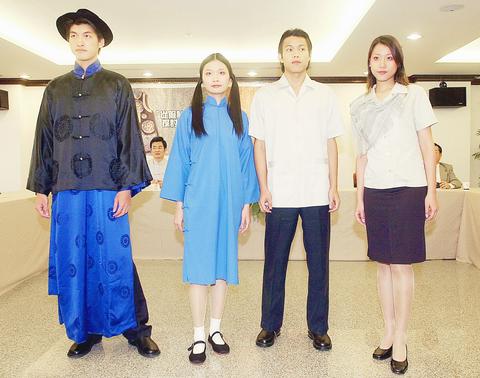As the government ponders whether to design a new national dress for Taiwan, scholars and fashion experts said yesterday that it is crucial that such an outfit be comfortable and modern -- and have a distinctly Taiwanese identity.
They made the remarks at a seminar hosted by the Ministry of the Interior yesterday for scholars, fashion experts and legislators to exchange opinions on whether there exists a need for designing a new national dress and what would be the appropriate style for such costume.

PHOTO: FANG PIN-CHIAO, TAIPEI TIMES
At the seminar hosted by Minister of the Interior Yu Cheng-hsien (余政憲), those in attendence also said that the Uniform and Dressing Regulation (服制條例), established 73 years ago, should be either amended or abolished, although no suggestions as to the content of an amended law were submitted.
The 1929 law states that government officials must wear national dress on formal occasions and when meeting foreign dignitaries, but this law has not been observed in decades.
In his opening speech to the seminar, Yu said that unlike many other countries such as Japan, Thailand and Korea, Taiwan does not have a national dress that reflects its image and spirit.
According to the Uniform and Dressing Regulation, Taiwan's national dress is the Manchurian-style long gown, and the civil servants' uniforms are "Chung-shan suits" (
"Since these old dress styles no longer suit modern society, the regulation must either be amended or abolished," Yu said.
"The ministry would like to gather expert opinions in the search for a beautiful form of dress for the Taiwanese people," said Yu.
According to the ministry, the new national dress should be formal wear designed for representing Taiwan on international occasions, similar to the kimono of Japan and the Indian sari.
Hu Tze-ming (胡澤民), a professor at Fujen Catholic University said that, although Western-style suits and ties are indispensable in modern society, it is crucial that Taiwan has a national dress that suits its subtropical climate and projects its distinctive image.
To win the acceptance of the general public, Hu suggested that strict rules should not govern the design of Taiwan's national dress but crucial elements that need to be included in the design should be clearly identified.
Lo Mai-ruei (羅麥瑞), another professor, said that since dress is a "power language" and is closely linked to a nation's history and culture, it is important for the Tai-wanese people to find out their cultural identity and blend it into the design of the national dress.
"The idea of multi-ethnic culture and the natural beauty of Formosa are all valuable sources in searching for the basic elements for the national dress," Lo said.
Huang Tsai-lang (黃才郎), director of Taipei Fine Art Museum, suggested that the creation of such a national dress should involve a gradual progress of accumulating thoughts and ideas from as many sources as possible in order to avoid controversy.
"However, the national dress should be comfortable, distinctive and elegant, and respect international social etiquette," said Huang.

CHANGING LANDSCAPE: Many of the part-time programs for educators were no longer needed, as many teachers obtain a graduate degree before joining the workforce, experts said Taiwanese universities this year canceled 86 programs, Ministry of Education data showed, with educators attributing the closures to the nation’s low birthrate as well as shifting trends. Fifty-three of the shuttered programs were part-time postgraduate degree programs, about 62 percent of the total, the most in the past five years, the data showed. National Taiwan Normal University (NTNU) discontinued the most part-time master’s programs, at 16: chemistry, life science, earth science, physics, fine arts, music, special education, health promotion and health education, educational psychology and counseling, education, design, Chinese as a second language, library and information sciences, mechatronics engineering, history, physical education

The High Prosecutors’ Office yesterday withdrew an appeal against the acquittal of a former bank manager 22 years after his death, marking Taiwan’s first instance of prosecutors rendering posthumous justice to a wrongfully convicted defendant. Chu Ching-en (諸慶恩) — formerly a manager at the Taipei branch of BNP Paribas — was in 1999 accused by Weng Mao-chung (翁茂鍾), then-president of Chia Her Industrial Co, of forging a request for a fixed deposit of US$10 million by I-Hwa Industrial Co, a subsidiary of Chia Her, which was used as collateral. Chu was ruled not guilty in the first trial, but was found guilty

DEADLOCK: As the commission is unable to forum a quorum to review license renewal applications, the channel operators are not at fault and can air past their license date The National Communications Commission (NCC) yesterday said that the Public Television Service (PTS) and 36 other television and radio broadcasters could continue airing, despite the commission’s inability to meet a quorum to review their license renewal applications. The licenses of PTS and the other channels are set to expire between this month and June. The National Communications Commission Organization Act (國家通訊傳播委員會組織法) stipulates that the commission must meet the mandated quorum of four to hold a valid meeting. The seven-member commission currently has only three commissioners. “We have informed the channel operators of the progress we have made in reviewing their license renewal applications, and

Taiwan-based publisher Li Yanhe (李延賀) has been sentenced to three years in prison, fined 50,000 yuan (US$6,890) in personal assets and deprived political rights for one year for “inciting secession” in China, China's Taiwan Affairs Office spokesman Chen Binhua (陳斌華) said today. The Shanghai First Intermediate People’s Court announced the verdict on Feb. 17, Chen said. The trial was conducted lawfully, and in an open and fair manner, he said, adding that the verdict has since come into legal effect. The defendant reportedly admitted guilt and would appeal within the statutory appeal period, he said, adding that the defendant and his family have